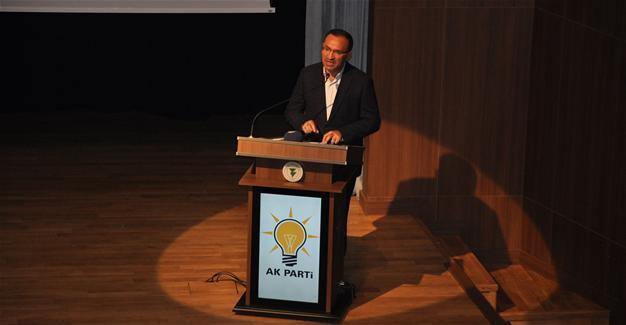Turkey rejects HRW torture report, claims reports one-sided
Pınar Erdoğan - ANKARA

Justice Minister Bekir Bozdağ speaks in an event in the Central Anatolian province of Yozgat in this file photo. Justice Ministry has denied Human Rigths Watch’s reports of torture after the thwarted July 15 coup attempt.
A Human Rights Watch (HRW) report on Turkey was prepared one-sidedly and does not show the concrete facts, Turkey’s Justice Ministry has stated in a detailed report issued in response to the New York-based human rights group’s claims of torture during post-coup operations.“First of all, the public should be informed of the fact that the report in question was prepared one-sidedly and in a way that is incompatible with the concrete facts, without any contact with government authorities and without any request for information, documents or opinions,” the ministry said Nov. 1.
HRW issued a report on Oct. 24, calling on Turkish authorities to “reinstate safeguards” that have been discarded by the state of emergency decree laws, paving the way for the torture and mistreatment of detainees in Turkish jails. The report, “A Blank Check: Turkey’s Post-Coup Suspension of Safeguards Against Torture,” studied 13 cases, indicating that people taken into custody after the July 15 coup attempt had experienced abuse including stress positions, sleep deprivation, severe beatings, sexual abuse and threats of rape.
The government’s response to the claims indicated that only two of the 13 different allegations of torture contained concrete information about incidents.
In the first of the incidents, detainees refused to eat, the ministry claimed, adding that contrary to the allegations in the HRW report, the prisoners enjoyed access to their lawyers but signed a statement indicating that they did not wish to continue meeting with their lawyers.
And in another incident, a detainee “lost his balance and fell down the stairs. Thereupon, he was referred to a full-fledged Training and Research Hospital.”
In a famous case in 1996, daily Evrensel journalist Metin Göktepe was said to “have fallen from a wall” and died, only for authorities to subsequently admit that he had been beaten to death while in police custody.
The government also stated that alleged medical problems may have been caused by the clashes during the July 15 coup, and given the fact that the majority of detainees were military officers, their wounds might have been sustained during the suppression of the coup attempt.
The ministry also justified the extension of the duration of police detention to up to 30 days, saying it was due to “the large number of members of the terrorist organization who took part in the coup attempt.”
The HRW report said a new state of emergency decree in which prisoners’ access to a lawyer can be denied for up to five days, “leaves detainees in de facto incommunicado detention.”
The ministry said access to lawyers can be restricted for up to five days at most and that the statements of suspects cannot be taken during this period.
“The reason for the introduction of the provision is to prevent criminals suspected of membership in terrorist organizations from applying pressure on those under custody via their counsels and from transmitting information to other members of the organization,” the government said.
The ministry also denied claims that the monitoring boards of penitentiary institutions and prisons were closed with a decree law on Sep. 1.
“The penitentiary institutions can always be inspected periodically when necessary by national/international inspection mechanisms,” it read.
















